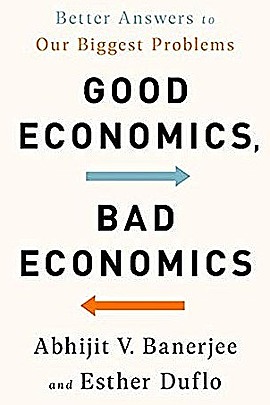
Good Economics for Hard Times
In Good Economics for Hard Times, Nobel Prize winners Abhijit Banerjee and Esther Duflo addresses the crucial economic challenges the world is currently facing. This revolutionary book features the cutting-edge research that these renowned MIT economists explained with transparency and grace. Original, provocative, and urgent, Good Economics for Hard Times makes a persuasive case for an intelligent interventionism and a society built on compassion and respect. It is an extraordinary achievement, one that shines a light to help us appreciate and understand our precariously balanced world.
"Excellent...Few have grappled as energetically with the complexity of real life as Esther Duflo and Abhijit Banerjee, or got their boots as dirty in the process...A treasure trove of insight...[Readers] will be captivated by the authors' curiosity, ferocious intellects and attractive modesty."
"Carefully argued and backed with research...Good Economics is an effective response to Banerjee and Duflo's more thoughtful critics, some of whom argued that devotion to randomised trials had led to a narrowing of Economics, in which complex questions that could not be scientifically tested should simply be set aside. The authors make a convincing case that empirical Economics contains answers to many vexing problems, from populism to identity politics, especially when economists are willing to range outside their discipline's confines."
― The Financial Times
"Lucid and frequently surprising... Banerjee and Duflo's arguments are original and open-minded and their evidence is clearly presented. Policy makers and lay readers looking for fresh insights into contemporary economic matters will savor this illuminating book."
― Publishers Weekly, Starred Review
"Good Economics for Hard Times lives up to its authors' reputations, giving a masterly tour of the current evidencecon critical policy questions facing less-than-perfect markets in both developed and developing countries, from migration to trade to postindustrial blight."
― William Easterly, The Wall Street Journal
"An excellent antidote to the most dangerous forms of economics bashing...Abhijit Banerjee and Esther Duflo, write beautifully and are in full command of their subject. Perhaps the greatest contribution of Good economics... is precisely this: it demonstrates both the brilliant insights that mainstream economics can make available to us and its limits, which a progressive internationalism has a duty to transcend."
― Yanis Varoufakis, The Guardian
"Not all economists wear ties and think like bankers. In their wonderfully refreshing book, Banerjee and Duflo delve into impressive areas of new research questioning conventional views about issues ranging from tradeo top income taxation and mobility, and offer their own powerful vision of how we can grapple with them. A must-read."
― Thomas Piketty, professor, Paris School of Economics, and author of Capital in the Twenty-first Century
"A magnificent achievement, and the perfect book for our time. Banerjee and Duflo brilliantly illuminate the largest issues of the day, including immigration, trade, climate change, and inequality. If you read one policy book this year -- heck, this decade - read this one."
― Cass R. Sunstein, Robert Walmsley University Professor, Harvard University, and author, How Change Happens
"Banerjee and Duflo have shown brilliantly how the best recent research in economics can be used to tackle the most pressing social issues: unequal economic growth, climate change, lack of trust in public action. Their book is an essential wake-up call for intelligent and immediate action!"
― Emmanuel Saez, professor of economics at UC Berkeley
"One of the things that makes economics interesting and difficult is the need to balance the neat generalities of theory against the enormous variety of deviations from standard assumptions: lags, rigidities, simple inattention, society's irrepressible tendency to alter what are sometimes thought of as bedrock characteristics of economic behavior. Banerjee and Duflo are masters of this terrain. They have digested hundreds of lab experiments, field experiments, statistical studies, and common observation to find regularities and irregularities that shape important patterns of economic behavior and need to be taken into account when we think about central issues of policy analysis. They do this with simple logic and plain English. Their book is as stimulating as it gets."
― Robert Solow, Nobel Prize winner and emeritus professor of economics, Massachusetts Institute of Technology



